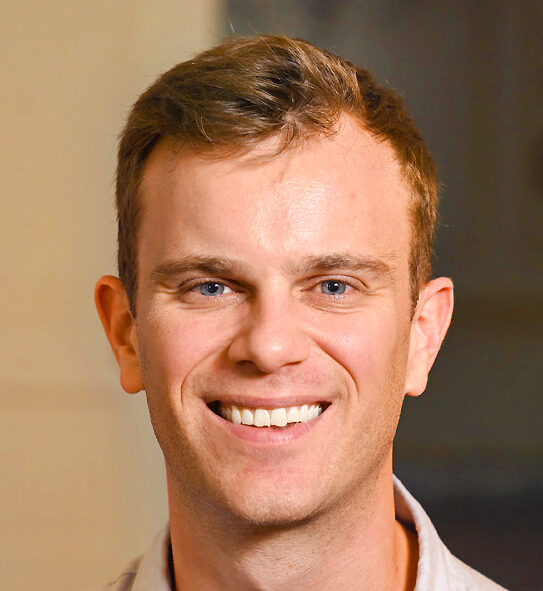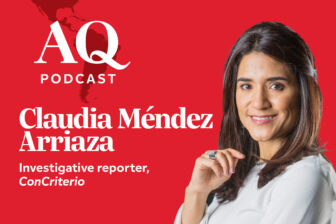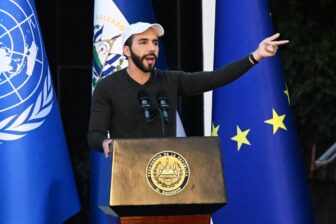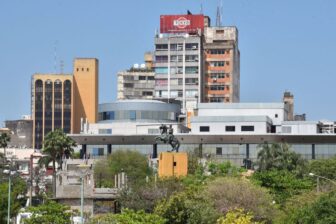GUATEMALA CITY — In March, Rony Ríos got into a vehicle in the middle of the night to leave the country. He was a reporter for elPeriódico, one of the country’s most important investigative outlets, which published its final edition on May 15.
Its director, José Rubén Zamora, continues to languish in prison after 10 months without a conviction. Four of Zamora’s lawyers have themselves been arrested, and the Public Ministry (MP) has ordered investigations into at least nine journalists, claiming their coverage of the trial may amount to obstruction of justice. Ríos was one of them. “I never wanted to leave,” he said. “But it was clear that if I didn’t, I’d also end up in prison.”
Guatemala is holding presidential elections on June 25, an event that under other circumstances might have yielded at least some hope for improvement in the climate of fear that has led many journalists, lawyers and anti-corruption prosecutors to flee in recent years. But instead, threats and legal pressures against independent voices have only intensified, exiled reporters and jurists told AQ.
Court rulings have sidelined several presidential candidates seen in some quarters as the only hopes for meaningful change to Guatemala’s increasingly undemocratic political system. As a result, the exodus continues, amid the expectation that Guatemala’s justice system will continue to be weaponized against anyone who dares to address corruption and other entrenched problems.
“Now, investigating corruption means exile, imprisonment or death,” Juan Francisco Sandoval told AQ. Sandoval led the Special Prosecutor’s Office against Impunity (FECI) for six years, handling cases involving many of the country’s most powerful people, including three presidents. He said threats of death and arrest led him to choose exile in August 2021.
Renowned high court Judge Miguel Ángel Gálvez lasted until six months ago. He’d spent more than two decades presiding over major trials for alleged crimes including genocide by former heads of state, killings and disappearances by death squads, and grand corruption involving presidents and narcos. Yet he said was never so vulnerable as when he left in November. Gálvez told AQ that despite government protection measures ordered by the Inter-American Court of Human Rights, he was still being followed. “The measures didn’t even guarantee my physical safety, much less my freedom,” he said.
Guatemala holds regular elections, but the Economist Intelligence Unit considers the country a “hybrid regime,” neither a full democracy nor a dictatorship. The U.S. government has placed sanctions on multiple officials, including Attorney General Consuelo Porras, for involvement in “significant corruption.” President Alejandro Giammattei—who cannot run for reelection—has countered international criticism by saying his administration is cracking down on corruption and respects judicial independence.
Like other anti-corruption jurists who are targets of MP investigations, Gálvez traces the current situation to Guatemala’s armed conflict (1960-96), which left 200,000 dead and 50,000 disappeared, the vast majority at the hands of the military and paramilitary groups. After the 1996 Peace Accords were signed, Gálvez said, the key issue of Illegal Clandestine Security Apparatuses—CIACS, for the Spanish acronym—was never resolved. During the armed conflict, these offshoots of military intelligence groups used violence and illicit networks to enrich themselves and favor the interests of the country’s economic elite, according to a report by a United Nations post-conflict fact-finding mission.
These groups continued to operate, Gálvez said, and only metastasized over the following years. In 2015, Guatemalan prosecutors working with the UN-backed International Commission against Impunity in Guatemala (CICIG) made unprecedented progress in uncovering the depth of corruption, showing that the sitting president, a former general, was leading a massive embezzlement ring. But as CICIG probes advanced and revealed alleged connections with influential business leaders, the elite closed ranks, expelled the CICIG in 2019 and continued to undermine potential threats, Gálvez and others said.
In recent months, three major presidential candidacies have been declared ineligible by the country’s court system, stirring controversy. On May 19, Carlos Pineda, a right-wing businessman from eastern Guatemala who had shot to the top of polling in May, was disqualified. Earlier this year, two other prominent contenders, Roberto Arzú and Thelma Cabrera, were also disqualified.
All this practically guarantees that whoever wins will be an ally of the status quo, Sandoval said. Moreover, the victor will inherit an unprecedented consolidation of executive power and erosion of checks and balances. Those in power “don’t use death squads anymore simply because they have the justice system at their disposal to annihilate any opposition,” he told AQ.
Meanwhile, the Public Ministry continues to press charges against its own prosecutors. On May 26, the judicial body arrested Stuardo Campo and Antonio Palencia, bringing the number of anti-corruption justice operators behind bars to eight. (Thirty-six are in exile.) They likely face long sentences; former prosecutor Virginia Laparra was sentenced in December to four years in prison in a verdict widely criticized as retribution for attempting to prosecute corruption.
This election cycle has been marked by more “civil death”—exile or imprisonment—than violence. But there are indications that more violence is on the horizon, said Wendy Geraldina López, a lawyer with the Unit for the Protection of Human Rights Defenders of Guatemala (Udefegua). She cited the growing trend of rural families being forcibly displaced by powerful landowners. Land and water conflict in rural areas, generally between Indigenous communities and large estates, is intensifying, especially as climate change exacerbates water and food insecurity.
Twenty-seven members of a single rural grassroots movement, Codeca, have been killed since 2018. Other rural organizations have faced similar violence. Now, “it seems that the groundwork is being laid for the danger [of violence] to grow,” Gálvez told AQ. López said she, too, is facing criminal charges for her work as a defense lawyer. “There are pressures and threats everywhere,” she said. “This is a dark time. But I’m going to keep working.”








